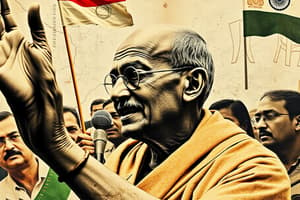Podcast
Questions and Answers
What is the main focus of the social science lecture on nationalism in India?
What is the main focus of the social science lecture on nationalism in India?
- Gandhi's successful movements in India and Africa
- The impact of the First World War on Indian independence
- The economic and political changes in India post-World War I
- Different forms of protests in India during the independence movement (correct)
What did Gandhi emphasize through his idea of Satyagraha?
What did Gandhi emphasize through his idea of Satyagraha?
- Supporting wars and conflicts
- Encouraging dishonesty for a cause
- Violent resistance and revenge
- Following the path of truth and nonviolent resistance (correct)
Which major movement led by Gandhi was against the oppressive system of indigo planters?
Which major movement led by Gandhi was against the oppressive system of indigo planters?
- Ahmedabad labor disputes resolution
- Champaran movement in 1917 (correct)
- Satyagraha movements in Africa
- Kheda movement in 1919
What inspired Gandhi's movements for independence in India?
What inspired Gandhi's movements for independence in India?
Which event led to famine and deaths in India during World War I?
Which event led to famine and deaths in India during World War I?
In which movement were people protesting against high taxes and the spread of the plague?
In which movement were people protesting against high taxes and the spread of the plague?
What was the main impact of the Rowlatt Act of 1919?
What was the main impact of the Rowlatt Act of 1919?
How did Gandhi respond to the Rowlatt Act?
How did Gandhi respond to the Rowlatt Act?
Which movement aimed at returning titles and honors given by the British to prominent Indians like Rabindranath Tagore?
Which movement aimed at returning titles and honors given by the British to prominent Indians like Rabindranath Tagore?
What act of protest was a significant step in the Non-Cooperation Movement?
What act of protest was a significant step in the Non-Cooperation Movement?
What was one of the demands in the letter sent by Gandhi to the British Viceroy during the Civil Disobedience Movement?
What was one of the demands in the letter sent by Gandhi to the British Viceroy during the Civil Disobedience Movement?
What did the Dandi March led by Gandhi protest against?
What did the Dandi March led by Gandhi protest against?
Flashcards are hidden until you start studying
Study Notes
- The speaker, Amit, is welcoming everyone to a social science lecture on nationalism in India.
- The lecture will cover topics like the First World War, Khilafat Movement, Satyagraha, and different forms of protests in India.
- The session aims to cover the entire chapter on nationalism in just half an hour.
- Gandhi's entry into the Indian independence movement during World War I is discussed.
- Gandhi's idea of Satyagraha emphasizes nonviolent resistance and following the path of truth.
- Gandhi's successful Satyagraha movements in India and Africa are highlighted.
- The impact of World War I on India is explained, including economic and political changes like increased taxes and customs duties.
- The flu pandemic and crop failures during that time led to famine and deaths in India.
- Gandhi's efforts to fight against discrimination based on skin color in South Africa through Satyagraha are discussed.
- Gandhi's success in South Africa inspired his later movements in India for independence, emphasizing nonviolent resistance.- Mahatma Gandhi led three major movements in India, starting with the Champaran movement in 1917 against the oppressive system of indigo planters.
- The Champaran movement was successful, mainly in Bihar, near the border with Nepal.
- In 1919, the Kheda movement took place, where people were protesting against high taxes and the spread of the plague.
- Ahmedabad also saw Gandhi's intervention between laborers and owners to resolve disputes peacefully.
- The Rowlatt Act was passed in 1919, empowering British authorities to detain individuals without trial, leading to widespread political involvement and protests.
- In response, Gandhi launched the Non-Cooperation Movement and Khilafat Movement, uniting Hindus and Muslims against British rule.
- The Non-Cooperation Movement started after the Calcutta session of the Congress in 1920, where Gandhi proposed merging the Khilafat and Non-Cooperation Movements.
- The Khilafat Movement aimed to return titles and honors given by the British to prominent Indians, like Rabindranath Tagore.
- The Nagpur session passed the proposal to return these honors, marking a significant step in the Non-Cooperation Movement.
- One of the key proposals was the return of titles and honors bestowed by the British, including those held by prominent figures like Rabindranath Tagore.- Students and teachers in schools are boycotting classes.
- There is a movement against foreign goods, promoting the use of locally made products.
- Different groups have different views on the movement, with some participating actively.
- Children are leaving schools, and lawyers are abstaining from practicing to support the cause.
- The farmers in Avadh region are protesting against high rent charges by landlords.
- The Andolans are about achieving Swaraj through different perspectives.
- The Simon Commission was formed in 1928 to suggest constitutional reforms for India.
- Gandhi led the Dandi March as part of the civil disobedience movement.
- The Dandi March started from Dandi village to protest the salt tax imposed by the British.
- Gandhi sent a letter with 11 demands to the British Viceroy, one of which was to abolish the salt tax.
- The Civil Disobedience Movement began with the Dandi March and the demands in the letter.
Studying That Suits You
Use AI to generate personalized quizzes and flashcards to suit your learning preferences.




